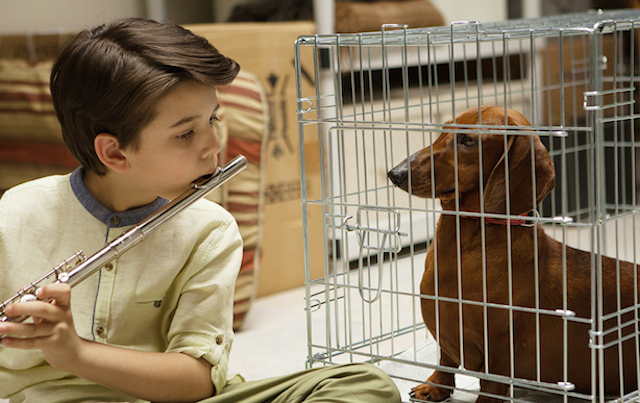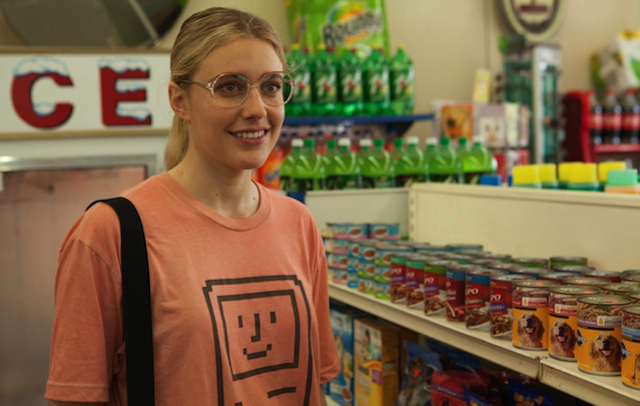CHICAGO – In anticipation of the scariest week of the year, HollywoodChicago.com launches its 2024 Movie Gifts series, which will suggest DVDs and collections for holiday giving.
Realistic, Difficult Lives Are Exposed in ‘Wiener-Dog’
 Rating: 4.0/5.0 |
CHICAGO –Director Todd Solondz has made a career out of not shying away from the most uncomfortable negativities of life. From extreme disconnection (“Happiness”) to pedophilia (“Life During Wartime”) to the sad rejection of pre-teen years (“Welcome to the Dollhouse”), Solondz pulls no punches. He achieves that harsh intent yet again in “Wiener-Dog.”
This is an anthology film, about a group of disparate people who somehow own the same female dachshund dog (the long bodied wiener dogs). It contains a quasi-sequel to “Welcome to the Dollhouse” (1995) – with Greta Gerwig portraying main character Dawn Wiener as an adult – and it tests the patience of any dog loving person as the pooch goes through a series of sorrowful circumstances. But this is what real life is, and Solondz to his credit is not afraid to expose it cinematically. It is tough stuff, and also tends toward the cynical dark side of human nature, yet in addition it scores as is an engrossing portrait of differently challenged personalities, and does contain a bit of hope.
A brown female dashshund “Wiener-Dog” is dropped off at a shelter, and is immediately adopted by the family of father Danny (Tracy Letts), mother Dina (Julie Delpy) and boy Remi (Keaton Nigel Cooke). The boy loves the dog, but an unfortunate canine illness has Danny taking her back to the shelter. Before she can be put down, she is rescued by Dawn Wiener (Greta Gerwig).

Remi (Keaton Nigel Cooke) Entertains the Title Character in ‘Wiener-Dog’
Photo credit: Amazon Studios
Dawn hooks up with an old school nemesis Brandon (Kieran Culkin) and goes on a visit to his developmentally disabled brother (Connor Robert Long). She leaves the dog with the brother, and when we see the dachshund next she is cared for by lonely Dave Schmerz (Danny DeVito). After a shocking incident, the dog ends up with elder retiree Nana (Ellen Burstyn), dealing with her granddaughter Zoe (Zosia Mamet). It’s a dog’s life in these different stories.
The camera never blinks, and there is distressing connotations in virtually all the characters, except (blessedly) for Dawn Wiener, the innocent boy and the developmentally disabled brother (and his wife, portrayed by Chicago actor Bridget Brown). This goes against the norm of a rooting interest in our movie characters, and makes the going a bit tougher in context with those standards. But if cinema is a reflection back to us, so should it be a reflection of our dark side as well.
Tracy Letts and Julie Delpy never flag from their diffident roles, and it can be argued that Delpy’s character should never have become a mother. The boy is suffering from cancer, but his Mom is either too burnt out or too morally lazy to care anymore. The life lessons she gives to the boy borders on psychological abuse, and these moments are among the most uncomfortable, in a film brimming with uncomfortable moments.
Greta Gerwig does a fine job resurrecting Dawn Wiener from “Welcome to the Dollhouse,” and injects a naive humanity into her that feels like Todd Solondz (the creator) is providing redemption for his character. She does dump the dog onto two people that clearly can’t take care of her – the developmentally disabled adults are shown authentically – but she does it through a good heart, which Dawn deserves.

Dawn Wiener (Greta Gerwig) Abides in ‘Wiener-Dog’
Photo credit: Amazon Studios
Danny DeVito knows lonely and dysfunctional souls with practiced ease, and suffers a fate regarding disrespected teachers that is truly humiliating. Ellen Burstyn (at age 83) is still a sharp professional, and gets to ponder the various indignities of old age with an honest performance. There is a delightful sequence where her younger selves appear in a dream, and it quickly and masterfully devolves into a recitation of the old woman’s sins. This is what writer/director Solondz does best, formulating typical archetypes (family members, social rejects, the elderly) and skewers them with real life.
Of course this isn’t a feel-good movie, but why should all our cinema escapes be based on feeling good? Occasionally, a reminder is necessary that life can be cruel and oh so short, as the fate of simply living continue its interventions.
 | By PATRICK McDONALD |


